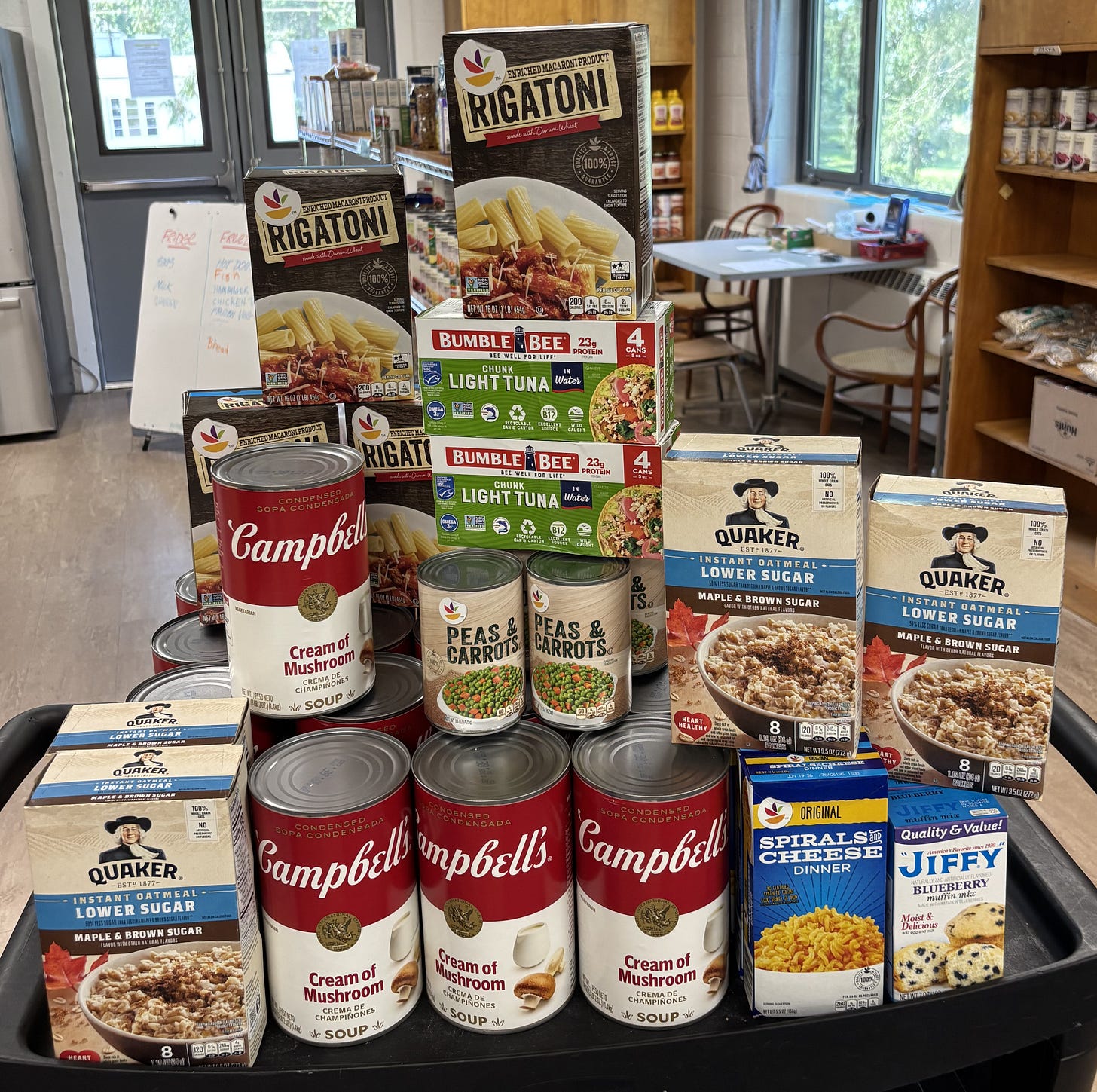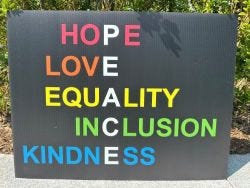P.E.A.C.E. Part Five - Kindness
Loving it all with vows, tears and the gift of cream of mushroom soup.
This is the fifth and final post in a series exploring one possible path to peace, individually and collectively. These posts explore the themes spelled out horizontally on our lawn sign pictured below. Week One’s focus was “hope” followed by “love,” then “equality,” then “inclusion.” Today’s theme is “kindness.”
Peace across the earth, to paraphrase the song (performed powerfully here by Gladys Knight), originates as a gift in each heart. True peace is both a gift and a practice, a way of seeing and being in the world. The five themes represented in the lawn sign are important pieces to the puzzle for me personally, ingredients for what seems like the best kind of recipe.
Every once in a while I have an opportunity to visit the Norfolk Food Pantry, which is housed in the same building as my office. The Pantry is open Tuesday through Friday from 10 AM to 1 PM, making Tuesday at 9:45 AM one of the busier times of the week in our facility.
Last week, we received a generous donation from the Yale Summer School of Art and Music kitchen staff on Tuesday around 9 AM. (Kudos to Chef Jeff and crew!) I figured it would be a bit of a curveball for pantry volunteers to intake this huge gift while patrons were lining up outside, so I stuck around to try to help sort and give away parsley, tofu, red delicious apples, massive bags of chopped kale, and much more.
Our volunteers are awesome. I needn’t have worried about their ability to handle a large donation while helping folks get what they need. The volunteers are gracious and efficient while corresponding clearly and compassionately with patrons. And they have a strong enough system in place that they’re not fazed by an interloping, schmoozy pastor who clearly doesn’t know where not to stand on the busiest morning of the week.
I wish food pantries didn’t need to exist, and maybe we’ll get there someday. In the meantime, I am honored to serve a church that has transformed empty rooms into a powerhouse ministry that feeds roughly 200 people each week. While I recognize that food pantries do not adequately address the root causes of hunger, I honor ours as a port in a storm and a locus of some powerful kindness.
The Greek word for kindness is “chrestotes,” and like most Greek words it has layers of meaning. Some of the nuances are less surprising, including goodness as well as gentleness. A deeper dive reveals that it refers specifically to a goodness that is Spirit-produced, and that true kindness is “well-fit for use” and “meeting real needs.” In Hebrew, “chesed” is used to refer to a mutual love that makes itself evident as active compassion and lived loving-kindness.
Kindness is no mere disposition, never only thoughts and prayers. Full kindness shows up as instant oatmeal or a three-pound can of cream of mushroom soup delivered with true care because we feel a stirring to help.
During a recent Sunday morning worship service, I presided over a brief vow renewal ceremony for a couple that got married 25 years ago. Before they exchanged the moving vows they’d written for each other, I shared a prayer that I often use during full weddings. “Eternal God,” it begins, “You have created us in love and for love, and made our hearts restless until we respond in love to you and to each other.”
There is deep truth here in the idea that we have within us as a birthright a force of holy loving that is yearning for release. This mysterious power pulsates and shimmers at the center of all things. It works like a magnet between spouses inspired to publicly restate why they love each other, and it draws together food pantry donors, patrons, volunteers - and sappy pastors. On a deeper level still, it radiates from a full moon enough to give us goosebumps, and it enables us to behold mountains and creeks as siblings.
Responding from love presents a healing, transformative alternative to a dynamic that is too familiar to us as a species: overreacting out of fear, ego or hate. News editors make choices, and headlines would have us reeling with the sense that all we ever do as a species is lash out in pain. For too long, we have embraced the idea of a zero sum game where tribes belong apart, battling for resources, colonizing wherever and whenever possible.
Our full story, though, includes more love and goodness than politicians and news outlets would have us believe. This includes holding doors for each other, trees offering oxygen, the perfect creamer in your coffee, your ability to read this, a soaring great blue heron, folks gifting ramen to people they may never meet, and so much more. What if we celebrated more regularly the notion of oneness and leaned into practices of loving a bit louder?
Richard Rohr, the Franciscan friar, author, and mystic, has written what he calls his last book, The Tears of Things. “All things have tears,” he writes, “and all things deserve tears.” He is rephrasing the ancient idea that God is in all that exists, that all that exists is in God. How would my life shift if I allowed myself to care about other nations and faiths, landforms and water bodies, planets and stars, so much so that I am moved to tears if they are targeted or harmed?
I hope we will stretch our definition of kindness, even if playfully, to show that it is an oxymoron to speak of the “other” as “not my kind.” I pray that we allow the spark of divine love within to burn ever more brightly, that we let it drive us to active compassion and life-changing good deeds.
Ignoring the hunger of others is easier than schlepping hefty cans of soup around town, to be sure. But when we forget or even willfully deny that we’re all one kind, it puts us out of sorts, gnawed by unexpressed love that feels at best like restlessness.
I choose a different way. I make a pledge to love it all and renew my vows of kindness to the universe. I will start by delivering some peanut butter to the Pantry.


